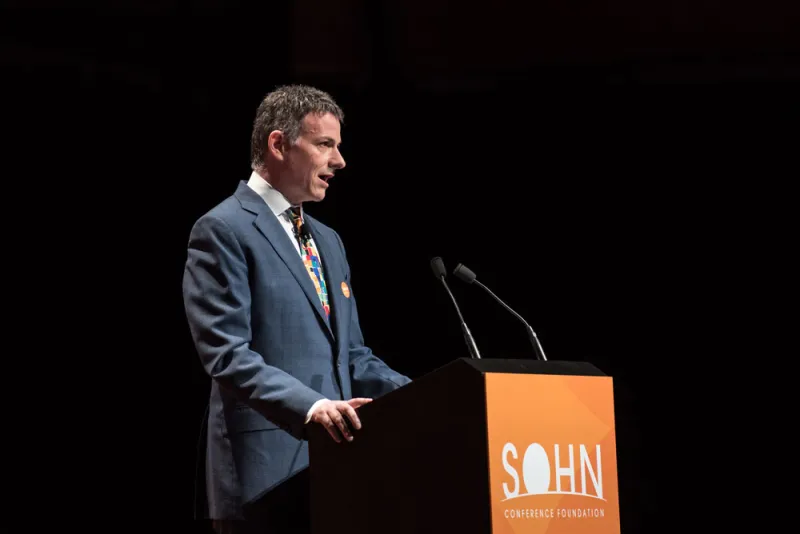Hedge fund manager David Einhorn's latest short target is bond insurer Assured Guaranty. But a small fund manager who's long that stock thinks Einhorn should really be looking at the alarm bells at another insurance company — Einhorn's own Greenlight Reinsurance.
Manal Mehta, founder and managing partner of San Francisco hedge fund Sunesis Capital, argues in a new report that Greenlight Re has problems on both its underwriting and investment side that are tied to — and could affect — its preferential tax status.
"I think Einhorn should short Einhorn," quips Mehta, whose 29-slide power point presentation, entitled "Greenlight Re: An elaborate tax avoidance scheme?", lays out numerous criticisms of Greenlight Re, a publicly traded reinsurer chaired by Einhorn.
"Greenlight Re is not a legitimate reinsurer. It should be classified as a passive foreign investment corporation," he argues. But without the tax break, Mehta claims in his presentation, it would be "lights out" for Greenlight Re.
Institutional Investor has not independently verified Mehta's claims. A spokesman for Greenlight was not immediately available for comment.
Greenlight Re is a permanent capital vehicle for Einhorn because it invests its premium income alongside his regular hedge funds through an entity called DME Advisors, where Einhorn is the manager. Moreover, the hedge fund billionaire is becoming more dependent on the reinsurer's premium income as Greenlight's investment losses in recent years have led to big redemptions in his traditional hedge funds.
[II Deep Dive: What Exactly Happened to David Einhorn?]
A number of hedge fund managers, including Einhorn, have set up reinsurance vehicles as sources of permanent capital that allow them to avoid paying capital gains taxes indefinitely. That has been referred to as the "Bermuda loophole," says Mehta.
To be considered a passive foreign investment corporation and not subject to U.S. taxes, the Internal Revenue Service requires the offshore reinsurer to be actively engaged in the insurance business. The tax break has been criticized by congressional Democrats, and last year's tax bill tightened the rules. Now, for a company to get the exemption, insurance liabilities must account for more than 25 percent of total assets, excluding what's called "unearned premium reserves."
Mehta says Greenlight has more than $255 million in "unearned premiums" that can no longer qualify, which he argues will force Greenlight Re to take on more unprofitable business to continue to qualify.
Greenlight Re has told investors it is "restructuring" its operations to accommodate the tax bill's changes to its business, which it says may introduce "increased risks," according to Mehta's presentation, quoting Greenlight Re's 2017 annual financial report.
After II contacted Einhorn's public relations representative, Jonathan Gasthalter, regarding this story, Greenlight COO Daniel Roitman sent Mehta an email stating "your personal attacks and aggressive behavior with third parties (rating agencies, reporters) . . . are unwarranted. I am not sure what you're hoping to accomplish, but I sincerely hope you don't cross any line you might regret."
Mehta says he considered the email, which he included in his report, a "veiled threat."
Mehta isn't the only person to complain about the hedge fund reinsurance business model. In 2016, Standard & Poor's questioned the ability of hedge fund reinsurers to continue, saying they had not made a profit for four years on the underwriting side, and the investment side had also plummeted. They also underperformed traditional reinsurers, which complained that the capital hedge funds poured into reinsurance had lowered its profitability, S&P found.
"To keep its tax status, Greenlight Re has been forced to keep writing premiums at a time when other, more experienced and better-capitalized players are exiting the market, " Mehta told II.
Last year, Greenlight Re's gross written premiums increased by 29 percent, to $692.6 million. At the same time, the underwriting losses and loss reserves jumped by more than 50 percent, to $464.4 million, according to its annual financial report. Greenlight Re lost $45 million in 2017.
"They're pricing too aggressively," Mehta says. "They don't have the luxury of saying 'we can't participate.' If they pull back on the volume, they're not going to be able to quality for the exemption."
S&P credit analyst Taoufik Gharib explained the conundrum facing the hedge fund reinsurers to the Financial Times in 2016. "The theory is that the higher returns from non-traditional investment strategies should offset the reduced profitability" from underwriting. But, he added, "we believe this thinking can be flawed and may not hold up."
In 2016, a hedge fund reinsurer run by John Paulson, whose hedge funds have faced sizeable losses, wound down. That same year, insurance rating agency A.M. Best lowered Greenlight Re's rating to an "A minus," which it affirmed last fall, while noting that "its return on equity metrics are at the lower end of established peers on a five year basis" and that "its underwriting results have underperformed most peers on a five year basis."
Mehta says "Greenlight Re is highly dependent on A- ratings to maintain sufficient underwriting volume and escape IRS designation as a PFIC."
The Greenlight Re critic told II he doesn't have a short interest in its stock. But he does have a financial interest in going after the company. A Yale graduate and formerly an analyst at Morgan Stanley and Peloton Partners before starting his own small hedge fund in 2012, Mehta has been an investor in Assured Guaranty for years and disagrees with Einhorn's view of it. "I decided to use his approach in analyzing his own insurance company," he says.
Einhorn is known for using humor to make a point, so Mehta has attacked him with some of the more clever statements from Einhorn's Assured Guaranty report, which the hedge fund manager unveiled at last month's Sohn Investment Conference.
Given its underwriting losses, Mehta asks, "Can Greenlight Re afford to have a melting ice cube of exposures?" — stealing a line from the hedge fund manager's short attack on Assured Guaranty.
DME Advisors had $2.26 billion in regulatory assets under management at the end of 2017, more than 40 percent of the firm's single hedge fund strategy, according to its latest public filings.
Since Greenlight Re's IPO in 2007, its investment portfolio has an annualized return of only 3 percent, according to an investor on the company's first quarter conference call. It reported a capital drawdown of 17 percent in the first quarter, due largely to losses on its investments.
Mehta argues that Greenlight Re has a conflict of interest since its chairman is the investment manager. The investments are also far more concentrated and riskier that a traditional insurer would allow, he notes.
He also questions why the rating agencies haven't been more critical of Greenlight Re. In its most recent report, A.M. Best lauds the investment manager's risk management culture, despite the poor returns.
Mehta's presentation concludes by quoting the fine print on Greenlight's risk factors in its latest Securities and Exchange annual filing. "We cannot assure you that ...the IRS will not successfully challenge our status," it says.
Greenlight Re's exemption from SEC regulations on investment companies also hinges on being "engaged primarily and predominantly in the reinsurance of risks on insurance agreements," the company notes in its disclosures.
If that were to change, Greenlight Re cautions, "we could become subject to monetary policies or injunctive relief or both."
Greenlight Re is down 25 percent this year, and 39 percent since the IPO.







